Rampant gang violence has created a humanitarian crisis in the Caribbean country, whose Prime Minister, Ariel Henry, resigned last week.
UN children’s agency UNICEF reported that on Saturday, one of its containers was looted at the main port in the capital city.
The container held essential items for maternal, neonatal and child survival, including resuscitators, as well as water equipment and critical supplies for early childhood development and education.
Condemning the looting, UNICEF emphasized that depriving children of vital health supplies amidst a collapsing healthcare system is a violation of their rights.
Discussions continue with port and State authorities on efforts to secure more than 300 containers belonging to UN agencies and non-governmental organizations (NGOs) in Port-au-Prince.
Delivering meals, tracking displacement
Meanwhile, since early March, the World Food Programme (WFP) has delivered 115,000 hot meals to people displaced in the capital.
UN health agency WHO and its regional office, the Pan American Health Organization (PAHO), continue to support the Hôpital Universitaire la Paix, the sole public hospital in Port-au-Prince with the capacity to treat trauma.
A new survey by the International Organization for Migration (IOM) found that in addition to creating displacement within the capital area, attacks and insecurity are pushing more and more people to leave the city to find refuge in provinces, taking the risk of passing through gang-controlled routes.
IOM said nearly 17,000 people left the capital from 8 to 14 March, and more than half are heading towards the Grand Sud departments – a region that is already hosting more than 116,000 people who have fled the metropolitan area of Port-au-Prince in recent months.
South Sudan: Surge in intercommunal conflict harms civilians
Civilians are bearing the brunt of a surge in intercommunal conflict in pockets of South Sudan, the UN Mission in the country, UNMISS, said on Monday.
UNMISS published its latest quarterly report on violence affecting civilians, which covers the period from October to December 2023.
A total of 233 incidents were documented during these months, with 862 victims either killed, injured, abducted or subjected to conflict-related sexual violence.
Warrap state was the main hotspot, with a staggering 87 per cent spike in victims as compared to the previous quarter, rising from 244 to 457.
Retaliatory attacks
The report specifies that more than half of those affected by overall subnational violence were caught up in retaliatory attacks related to the ongoing dispute between Dinka Twic Mayardit in Warrap and Dinka Ngok communities in the Abyei region.
“UNMISS is doing all it can to prevent violence and build peace in the affected areas, but urgent intervention by authorities at the national, state and local levels is needed to resolve underlying grievances and build peace,” said Nicholas Haysom, Special Representative of the Secretary-General and Head of UNMISS.
The report also revealed a nearly 55 per cent increase in abduction victims, from 65 to 100, mainly men and boys.
Additionally, 104 victims were subjected to sexual violence. Of this number, 63, including 12 minors, experienced conflict-related sexual violence. Another 41, mainly girls and women, suffered sexual and gender-based violence.
UNMISS said that although this represented a 20 per cent decrease in victims compared to the previous quarter, sexual and gender-based violence remains among the most critical threats.
Testing for COVID-10 (file)
UN chief ‘deeply concerned’ at deteriorating situation across Myanmar
The Secretary-General is deeply concerned by the deteriorating situation and escalation of conflict in Myanmar, said his Deputy Spokesperson in a statement issued on Monday.
“He condemns all forms of violence and reiterates his call for the protection of civilians including aid workers in accordance with international humanitarian law, for the cessation of hostilities, and humanitarian access”, said Farhan Haq.
An expansion of the fighting in Rakhine state between the forces of the military regime – which overthrew the democratically elected Government in February 2021 – and separatist and independent militia, is driving a new wave of displacement.
It is also exacerbating pre-existing vulnerabilities and discrimination.
“The Secretary-General calls on all parties to prevent further incitement of communal tensions”, said Mr. Haq.
“He is alarmed by reports of ongoing airstrikes by the military, including today in Minbya township that reportedly killed and injured many civilians. He is concerned by reports of forcible detention and recruitment of youths, including Rohingya, and the potential impact of forced conscription on human rights and on the social fabric of communities in Myanmar.”
Mr. Guterres also called for “sustained” international and regional attention to the Myanmar crisis.
“Addressing the root causes of systemic discrimination in Myanmar and seeking accountability for serious violations of international law will be central to any lasting solution to the crisis.”
Meanwhile the UN is committed to staying and delivering in Myanmar, including the ASEAN regional bloc “to attain sustainable peace.”‘
Pandemic treaty’ deal enters final round of negotiations
The head of the UN health agency issued an appeal on Monday to the international community not to miss the chance to sign on to the so-called Pandemic Treaty.
“We cannot forget the trauma of the COVID-19 pandemic and the painful lessons it taught all of us,” said Tedros Adhanom Ghebreyesus, as he urged Member States not to forget “the seven million people” at least who died during the coronavirus emergency.
Countries gathered at World Health Organization (WHO) headquarters in Geneva have begun a nine-day negotiating marathon towards finalising a draft agreement.
Tedros told delegations that the “potential benefit” of the treaty “cannot be measured and will endure for generations”.
But, media reports have indicated that potential obstacles to a deal include concerns among low- and middle-income countries that they may not be compensated sufficiently for working with drug manufacturers nor given enough technical know-how to make medicines themselves.


